The Balanced Housing Lab is an innovative partnership between the City of North Vancouver, District of West Vancouver, Squamish Nation, senior levels of government, and other stakeholders. Together, we are working to develop solutions to the housing challenges facing our communities.
Problem Statement:
On the North Shore, owning a home is increasingly out of reach. At the same time, vacancy rates for rentals are at all-time lows and the cost of renting is high. People who work on the North Shore cannot find suitable and affordable housing near where they work. Housing for these working households is sometimes called “the missing middle”. This missing middle refers to a gap in available housing to meet the needs of middle-income earners. If nothing changes, this gap will continue to grow.
Throughout the process, these are the barriers to housing that have been highlighted:
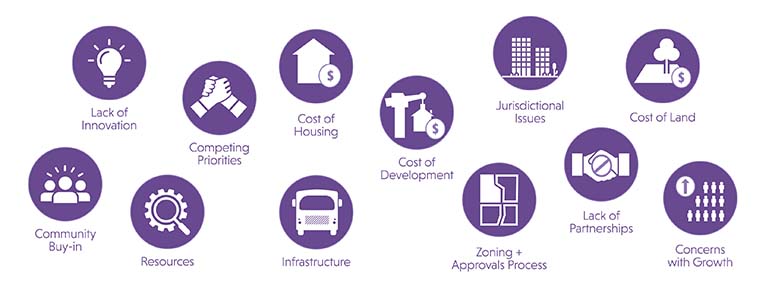
There are a number of initiatives underway in each of our communities to address housing. This particular initiative is focused on the following challenge:
Our Communities
Middle-income households are a big part of our communities:
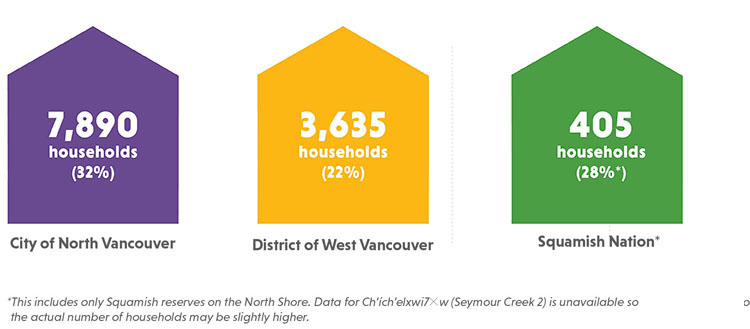
Throughout the different communities, middle-income earner households include different family and household types:

In Squamish Nation, one of the major challenges lies around having enough local capacity to respond to housing issues. Most members (40%) of Squamish Nation live in the Lower Mainland. At the same time, there are households of all ages who are currently waiting for housing. People of all ages are impacted by the local housing challenges.
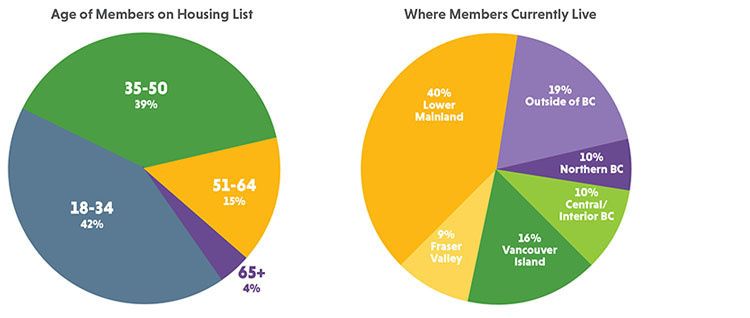
When it comes to housing issues, City of North Vancouver and District of West Vancouver face issues around housing affordability as illustrated by the figures below.
Housing Affordability Gap in the City of North Vancouver:
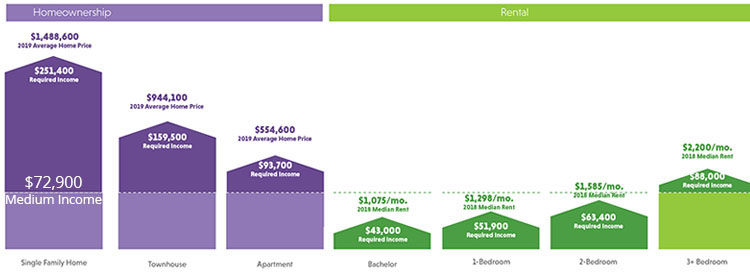
Housing Affordability Gap in the District of West Vancouver:
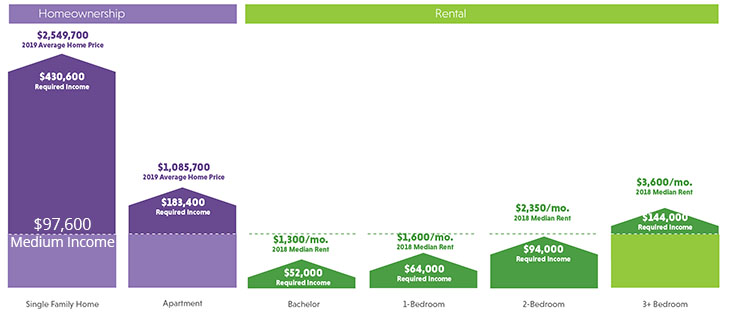
Our Partners
The Housing Lab initiative is made possible by our partners, City of North Vancouver, District of West Vancouver and Squamish Nation.
Our continued economic health and strength as a community in the City of North Vancouver depend on delivering housing options that are within reach for the average family and for our workforce. With the Balanced Housing Lab we are bringing decision makers, experts, and residents together to help address this problem with new ideas to ensure there are healthy and attainable housing options for all.
Mayor Linda Buchanan, City of North Vancouver
West Vancouver Council has highlighted the need for workforce housing in our strategic plan, but we know this is a regional challenge and a collaborative approach is required. The Balanced Housing Lab will focus on actual working prototypes to develop solutions for our working individuals and families of moderate income.
Mayor Mary-Anne Booth, District of West Vancouver
The Squamish Nation’s strategic vision is to build positive working relationships with external relations and neighbouring governments. We welcome the opportunity to work together through the Balanced Housing Lab to identify shared interests and solutions to the housing needs of North Shore residents, especially for the Squamish People.
Khelsilem, Squamish Nation

The Steering Committee and Project Working Group are supported by:
- BC Housing
- Government of BC
- Governement of Canada
- UBC Housing Research Collaboration
- North Vancouver School District
What is a Lab?
Challenges – like housing on the North Shore – are too complex for any one of us to solve on our own. Instead we need to harness the knowledge and experience of people who come from across sectors and backgrounds.
Solutions labs – like the Balanced Housing Lab – provide a way for us to do this. People who understand different parts of a challenge come together to create and test solutions.

This process is meant to be:

Who are the Lab Participants?
Lab participants took part in a series of four lab workshops between December 2019 and April 2020.
Lab participants included middle-income earners currently facing housing challenges, as well as people with expertise in academia, housing advocacy, planning, development, business, education, and local governance. This diversity of backgrounds and experiences allowed us to look at these challenges from different perspectives and come up with creative approaches.
What is a Prototype?
Early in the lab process, participants were split into three groups to focus on generating ideas and solutions.
Prototyping refers to the process of generating ideas, testing those ideas, and learning and iterating on the ideas to generate “prototype” solutions. The prototype solutions represent ideas that will be further tested and explored, and the learnings shared across the partner communities.
About the Three Prototypes
Prototype #1: Re-Imagining the Development Approvals Process
 In order to address the concerns raised through the Lab process about the contentiousness of the existing development approvals process, Prototype #1 worked to develop a prototype for an alternative process. This alternative process is intended to engage with the public earlier in the development process and to provide more opportunities for diverse voices to be heard. It is also intended to inform City Council of concept designs in the earlier stages of the project to ensure they align with broader community objectives.
In order to address the concerns raised through the Lab process about the contentiousness of the existing development approvals process, Prototype #1 worked to develop a prototype for an alternative process. This alternative process is intended to engage with the public earlier in the development process and to provide more opportunities for diverse voices to be heard. It is also intended to inform City Council of concept designs in the earlier stages of the project to ensure they align with broader community objectives.
The City of North Vancouver is testing and evaluating this alternative development approval process through a pilot project that includes a component of mid-market housing. To learn more and/or provide feedback on this pilot project, please visit Development Approval Process Pilot.
Pilot Development Approvals Process
Prototype #2: Indigenous and Non-Indigenous Partnerships
 While many First Nations and local governments across Canada work together on shared infrastructure and services, there are limited frameworks for how these levels of governments might work together on housing. Prototype #2 worked to develop a shared understanding of the barriers and opportunities when it came to Indigenous and non-Indigenous partnership on the North Shore, and to develop a prototype for putting this into action.
While many First Nations and local governments across Canada work together on shared infrastructure and services, there are limited frameworks for how these levels of governments might work together on housing. Prototype #2 worked to develop a shared understanding of the barriers and opportunities when it came to Indigenous and non-Indigenous partnership on the North Shore, and to develop a prototype for putting this into action.
Participants from the lab workshops identified the following key next step: creating an opportunity to bring together elected officials from all three communities in a meaningful way. Earlier this summer, the Lab’s Steering Committee committed to moving forward with additional engagement between elected political representatives and all levels of staff at the Squamish Nation, City of North Vancouver and District of West Vancouver. These workshops led to concrete commitments for further partnership and collaboration at the political, executive staff, and planning staff levels.
Summary of Partnership and Housing Considerations
Prototype #3: Housing Opportunity Areas
 Prototype #3 explored a variety of innovative models and tools for delivering more affordable housing. The Housing Opportunity Areas concept that emerged offers opportunities to add mid-market housing or more affordable housing to land use designations that either have not conventionally been used for residential dwellings, or are currently used for housing but may be able to accommodate more mid-market housing.
Prototype #3 explored a variety of innovative models and tools for delivering more affordable housing. The Housing Opportunity Areas concept that emerged offers opportunities to add mid-market housing or more affordable housing to land use designations that either have not conventionally been used for residential dwellings, or are currently used for housing but may be able to accommodate more mid-market housing.
In the District of West Vancouver, the area being explored includes:
In the City of North Vancouver, the areas being explored include:
- Residential Level 5 – OCP Land Use Designation
- School/Institutional – OCP Land Use Designation
The City is working towards an implementation and pilot process to continue this work.
Housing Opportunity Areas Emerging Prototype
Final Report
The Balanced Housing Lab Final Report outlines the lab process, prototype solutions, roadmap for implementation and scaling, and lessons learned from the project. Read the full report.